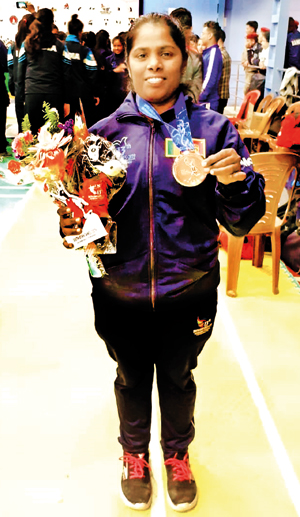Rags to Riches

S.K. Bavani Sri proudly displaying her bronze medal
There was an explosion of unbridled joy by a Sri Lankan female fencer when they claimed a team bronze medal in the Foil event at the 13th South Asian Games in Kathmandu in December. It was as if she had conquered the summit itself in the land of the Everest. Her extravagant celebration which reverberated across the region was not just a glorious sporting triumph but of life itself. It is a tale of courage over adversity.
Born to a destitute family in the central region, S.K. Bavani Sri loved to indulge in sports when she attended Kotheyrie Tamil MV. The second in a family of two sisters from Maymolly division, Frotoff group, Ramboda, her father’s meagre earnings was not enough to make ends meet. To earn a living, she worked as a domestic aide tenderly caring a lady suffering with a broken leg in Balagolla for three and half years. It turned out to be a blessing in disguise as Bavani’s life changed when she gained employment at MAS Linea Clothing plant in Pallekelle on a recommendation made by an acquaintance of the lady Muthuvel Kalavitiyawa.
Her love for sports saw her attracted to fencing following her hostel friend Renu. “I just went to watch and then liked to play. My friend stopped but I continued playing,” said Bavani who became an integral member of Linea Fencing Club Foil team since 2014, winning two gold, one silver and five bronze medals during her career.
However, it was not all smooth sailing. When she began training, her pulse rose to 38. “My coach told me later he wanted to stop me from playing. But thankfully after practising it came down to the required level,” recalled Bavani eternally grateful to her coaches Asiri Wijesinghe and Piyumi Krishanthi for their encouragement and guidance.
“In my plant, Shivantha (de Silva) Sir also helped me a lot in my fencing career. He had a lot of faith and confidence in my abilities and that I will bring a medal at the SAG Games,” she added.
Apart from her colleagues at MAS Linea Clothing, the biggest influence in her life was Wijesinghe.
“Asiri coach was like my father and friend. He looked after me. Whatever problem I have, I tell him and he used to resolve them. He encouraged me to play in order to forget my problems. I tell him everything. I don’t hide anything from him,” she said.
“He only recommended me to Piyumi akka. Since I was Tamil and did not know much Sinhala, he taught me Sinhala as much as possible. In fact, everything about life,” said Bavani who seemed to have a prophecy that she would win a medal in Nepal.
“I knew I will anyhow win a medal before going to Nepal. I told my plant colleagues during a farewell reception that I will return with a medal. In Nepal, I remembered what my coach had taught me and the promise I had made to my colleagues. I was determined to win a team medal especially after I failed to win my individual bout. I wanted to give my maximum. Coach Ganeshan and Gayan Bandara were also there. They spurred me to go for a medal,” she recalled.
“My coach told me not to get scared even though we are in a different country. I didn’t feel scared or nervous in Nepal though I went abroad for the first time. All the members of the team loved me a lot. I screamed with delight at every point I got and jumped for joy,” she said getting applause from her opponents as well.
She remembered coach Asiri when she got the medal around her neck. “He was the one who helped me. My coach was proud of me. I told my colleague in the plant as well,” she said rushing to celebrate her victory with her friends.
“Bavani came up in life amid many problems. As an athlete she has lot of courage. She never gives up. She is like a soldier going to the battle field. A Tamil girl who didn’t know English, I trained her a bit during the camp but she spoke English well in Nepal. On the return flight she got a window seat and even conversed fluently in Hindi with an Indian lady. I remember at the SAG she enjoyed and celebrated every point won against Pakistan. Their manager appreciated her exuberance and gave her a gift,” said Wijesinghe.
She showed plenty of courage and determination to take on the family responsibility when her father suffered an ailment.
“After I earned money, I used to send it home. Now my father is alright,” recalled 29-year-old Bavani who learnt to speak Sinhala when she worked as a domestic aide.
Married this year and expecting a baby in November, Bavani has no plans to retire from fencing. “My husband supports and I want to continue fencing,” said Bavani who is awaiting the gift of a land promised by the State after her medal-winning feat as she lives in a line home in Digana.


